“A hidden bond of sorts has always connected theatre with a search for the identity of a community, a social situation in a given collective, city or nation,” says Jiří Havelka (born in 1980), a key member of the middle generation of Czech directors and also an actor, playwright, and head of the Department of Alternative and Puppet Theatre of the Academy of Performing Arts (DAMU). His creative profile is dominated by two distinct features: an authorial, often improvisation-based approach (during the course of a professional career spanning fifteen years, he has directed fixed dramatic texts only sporadically) and by a fundamental interest in social topics.
He presents his audiences with controversial events from the Czech past and provocatively invites them to form their own opinions. For example, he did so in I, Hero (2011), a production focusing on the Mašín brothers, young men whose resistance group fought communist terror in the early 1950s at the cost of endangering their own lives but also at the cost of sacrificing the lives of their fellow citizens and ordinary policemen. Havelka staged the ideologically complex topic as a reconstruction of individual events with significant emphasis on the “constituent elements” of the case, i.e. without including any preliminary interpretation. The actors presented the audience with different historical facts, which were subsequently refined or illuminated from various angles in order to make spectators form and then re-evaluate their views of a significant chapter of modern Czech history. At the end of the performance, viewers were invited to decide whether the Mašín brothers were in fact heroes or murderers.
In the site-specific production Brass Band (2013), Havelka attempted to capture – in three retrospective scenes, each occurring at a different time in the same place – the history of a specific location, in this case the communal hall of the village of Dobronín, where a group of German village folks was brutally murdered by their Czech neighbours during the spontaneous post-war expulsion of German inhabitants from Czechoslovakia.
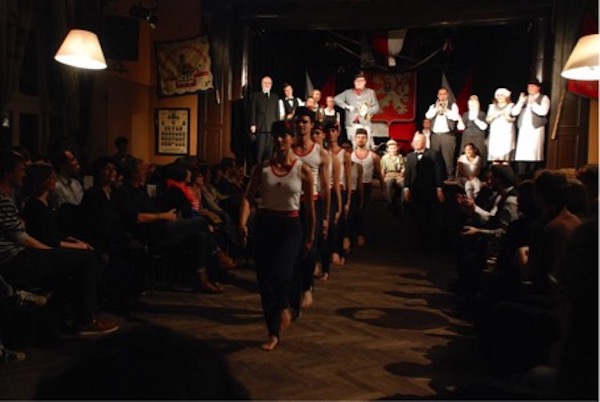
Brass Band. Photo Credit: Jiří Havelka.
For Havelka, a holder of the Prize for an Outstanding Contribution to the Reflection of Modern History, awarded by the Institute for the Study of Totalitarian Regimes, the past serves as a vehicle for contemplating the present, a channel for exploring how our actions and our ancestors influence our presence, our cultural memory and our national identity. “We have the politicians we deserve. And, after a meeting of the homeowners’ association, I often think that perhaps even better than we deserve,” as one of my professors used to say.
It seems that a similar premise constitutes the basis for Havelka’s production of The Fellowship of Owners (2017), staged by his home theatre company VOSTO5. The site-specific production takes place in a disagreeable conference hall where the members of the homeowners’ association of a Prague residential building regularly gather around a large table to address issues including necessary building-repairs and future financial outlays. Spectators are seated in two rows around the perimeter of the room, in effect almost erasing the boundary between space allocated to the actors and space assigned to the audience. The realistic feeling of the situation is further emphasized by a distinct lack of stage lighting and music.
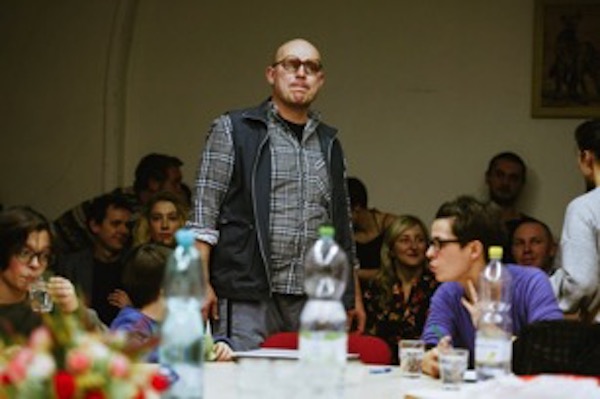
The Fellowship of Owners, VOSTO5. Photo Credit: Jan Hromadka.
This game of authenticity, the deliberate suppression of the artificial nature of theatrical reality, gives viewers the impression that what they are witnessing is a situation developing in the here and now, perhaps even a collective improvisation – though it eventually becomes clear that both the text and the entire theatrical form have been carefully constructed and fixed. Havelka relies on the fact that a large part of the audience has attended similar meetings and, by minimizing the distance between “us and them,” strives to create the most suitable conditions possible for a collective sharing of the experience.
In a similar vein, the acting is also designed to create an impression of authenticity, with seemingly deliberate actions taken to reduce spectator comfort; some actors are only seen from the back (as a result of the seating arrangement), sometimes the actors mumble and only those who are close enough are actually able to hear what is being said, etc. However, this is not the outcome of stylistically coordinated and consistent underacting: the cast was deliberately assembled to include actors of diverse styles and theatre experience. It is in fact the disparate nature of the acting which enhances the impression of an almost documentary-like authenticity.
The characters include: a woman on maternity leave who also functions as the association’s chairwoman and who repeatedly strives for constructive discussion in the hope of addressing the full list of debate items; a former caretaker who refuses to accept the new democratic norms and who blocks debate purely for spite; a measured audit-commission member who takes her function very seriously, pedantically supervising the proper conduct of the meeting in accordance with all applicable statutes; a thin-skinned pensioner who spends her days spying on her neighbours; an ironic young liberal who never misses an opportunity to poke fun at his narrow-minded neighbours; a pair of young tenants hoping to make a good first impression; an intellectual with lofty ideals who spends the entire meeting reading; and two brothers who have just inherited one of the apartments and who seem to have a ready-made solution for everything.
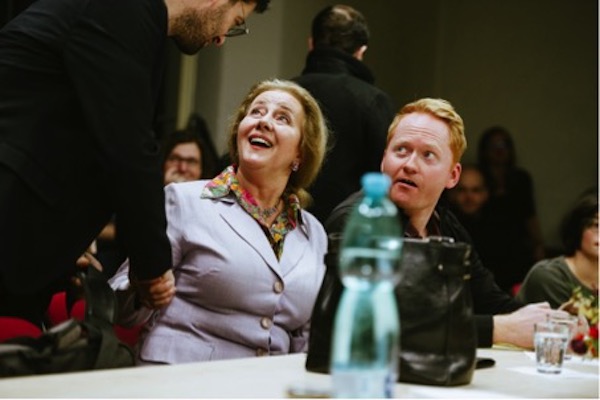
The Fellowship of Owners. VOSTO5. Photo Credit: Jan Hromadka.
The production initially resembles a sequence of gags based on well-constructed dialogues, which the spectators perceive as funny largely because many have experienced similar situations and met similar characters. These characters include the likes of an old retired lady who haggles over every penny on the common utility bill, because while she keeps saving water, Mr. Nitranský visits the shower much too often and leaves much too late, thereby increasing electricity consumption in common areas. There is also the not-exactly-bright Mr. Švec whose attempt to falsify a power of attorney document in order to represent his sick mother fails when he signs the form “mum.” In hopes of keeping the meeting together, the association chair doggedly keeps returning to the various substantive matters at hand, including a necessary gas pipeline inspection, a planned roof renovation and a common space purchase scheme. Her attempts, however, are boycotted again and again and what started as a calm debate turns into lively discussion and ends in a quarrel.
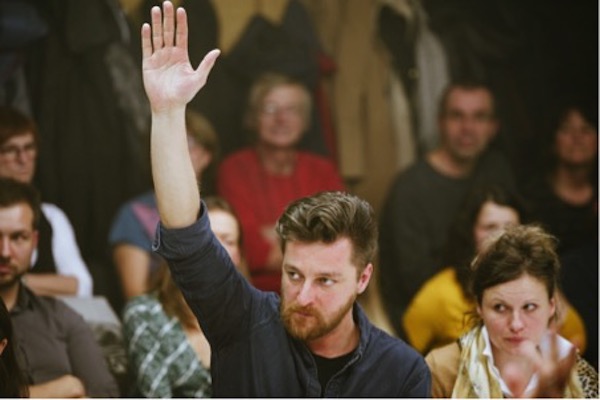
The Fellowship of Owners. VOSTO5. Photo Credit: Jan Hromadka.
As in a well-written comedy (Yasmina Reza’s God of Carnage came to mind several times), the characters initially attempt to maintain decorum. However, as the situation escalates, they begin to show their true colors: their narrow-mindedness, pettiness, racism, homophobia, lack of judgement, envy, manipulativeness, hysteria, and ordinary stupidity all begin to come out. Speech ceases to serve as a communication tool: with dialogue suddenly morphing into a series of repetitive monologues, language becomes a tool for establishing self-importance, a weapon wielded by individual characters in order to exert their control over others. “Nothing. All I have to do is nothing. I’m an owner. An owner! That’s all it takes. “No” simply means “No”. You’ve heard that here before today. “No” is a reason. “No” is an argument. “No” is my right! “No”. “No” and “No”. Your votes mean nothing. Nothing! I own three units here!”

The Fellowship of Owners, VOSTO5. Photo Credit: Jan Hromadka.
As the homeowners’ meeting turns into an absurd power struggle, and as the rigorously executed play on non-theatricality (i.e. “real meeting”) reaches a breaking point, Havelka finally decides to supply the audience with a certain measure of theatrical elements. A scene where the pregnant Mrs. Bernášková nearly gives birth on the meeting room table thus takes place in a cinematic slow motion, with the accompaniment of dramatic opera music and with artificial smoke billowing in through the window. The scene then grinds to a halt, exposing the still, terrified expressions of the performers. The alarm eventually turns out to be false and the owners make an effort to return to the meeting agenda. However, the patience of everyone is wearing thin and it is becoming increasingly clear that mutual agreement is impossible. Once the chair resigns, the session spirals out of control as inspector Roubíčková refuses to let her out of the room before the end of the meeting. A furious fight between the two decently dressed women ensues: they run amongst the spectators, pull each other’s hair and choke one another with silk scarves.
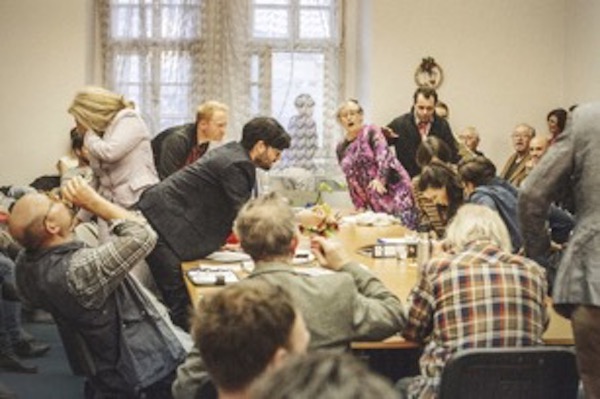
The Fellowship of Owners, VOSTO5. Photo Credit: Jan Hromadka.
In the epilogue, the Čermák brothers, who observe the entire row from the sidelines, suggest to the ravaged association that their company would be more than happy to prepare an investment plan – free of charge – and resolve any and all problems. All they need to set things in motion is a written consent form signed by all of the homeowners. With a painless solution almost within their grasp, one neighbour after another (including those previously unwilling to cooperate in the slightest) signs a blank power of attorney form. At the next meeting, there may well be little to discuss…
Though it begins as a documentary-style depiction of an ordinary meeting, The Fellowship of Owners is gradually transformed into a drama with carefully crafted dialogues, a range of leitmotifs and an evolving structure, with the homeowners’ meeting itself providing something of a dismal image of our society. A divided society whose capacity or will for seeking consensus has been displaced by aggression and an inability to engage in a proper debate. Such meetings – as well as the general political and media landscape – convince us on a daily basis that it has become quite rare to engage in a discussion without fallacies, personal attacks, and without using language as a tool for diverting attention. Democracy fatigue, a general desire for easy solutions to complex problems, relying on strong leaders over exercising willingness to take on responsibilities around our personal freedoms – such a depiction of society resonates well in the Czech Republic while also being easily understood elsewhere in Europe as well as overseas.
Whereas The Fellowship of Owners maps the present-day state of affairs, Havelka’s Elites (2017), staged at the Slovak National Theater in Bratislava, marks a return to the Czechoslovak past. Elites ranks among Havelka’s productions inspired by the modes of documentary theatre. The text is based on documents and testimonies preserved at the National Memory Institute and in the archives of Czechoslovak State Security. Established as a communist political police force in 1945, State Security was designed to consolidate power positions and prosecute political opponents as well as serve as the primary instrument of communist terror in Czechoslovakia. Havelka, however, is not interested in providing a detailed depiction of secret police practices; instead, he focuses mainly on the fate of selected individuals who currently serve as Czech and Slovak political representatives, i.e. present-day social elites who had, under the previous regime, co-operated with state security.
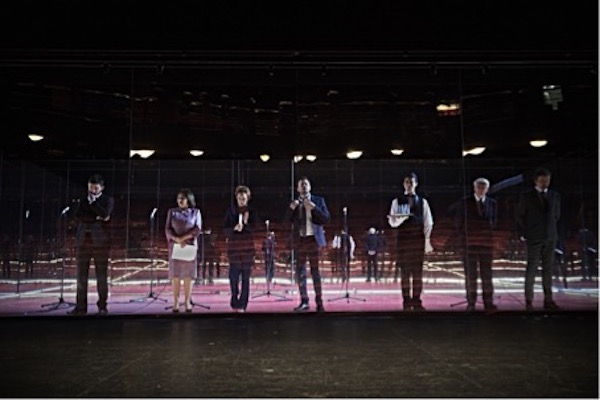
Elites. Photo Credit: Vladamir Kiva Novotny.
When Ms Horváthová signs the power of attorney form presented by the Čermák brothers in The Fellowship of Owners, she happily concedes that at long last the building will finally be “run like a business”, a phrase derived from the election slogan of Andrej Babiš, the current Czech prime minister, who entered politics as a successful businessman on a promise to run the state efficiently – like a big family business. Where a direct acknowledgement of Czech political reality constitutes something of a conclusion of The Fellowship of Owners, a nod to the same provides Elites with a point of departure. The first line, uttered by a secret police officer meeting with his agent is: “Greetings, Andrej, right on time.” The audience is thus instantly made aware of who is at the centre of attention – and while many situations are approached in schematic or metaphorical rather than documentary fashion, the production largely tends towards the particular. Characters are mostly addressed by their aliases, many of which have become well-known, and the audience should not find it difficult to identify certain individuals, chief among them “agent Bureš,” the alias name of Andrej Babiš. His collaboration with State Security came to light after his entry into politics; following a targeted change of the lustration act, designed to prevent employees of Communist-era police forces from holding public office, and due to unprecedented actions taken by the Czech president, Babiš was first appointed minister and subsequently prime minister.
The scenography, designed by Lucia Škandíková, features a conspiratorial apartment furnished with period furniture which serves as a meeting point for state security officers and their confidants; however, it also doubles as a metaphorical depiction of a completely snitch-ridden country where no place could be considered safe from communist police forces, not even one’s own home. The audience is separated from the on-stage apartment, where most of the action takes place, by a glass wall. Sound is transmitted through the glass barrier by microphones, further emphasizing the Orwellian nightmare of constant surveillance. The glass wall may also be illuminated like a mirror; this feature is utilized as the spectators are taking their seats prior to the beginning of the production as a clear indication that what they are about to witness is a play about all of us, a reflection on our collective conscience. Though somewhat crude, this introductory element provides the audience with a clearly defined focus. After all, the production is not really about secret police agents; rather, it is an inquiry into how Czech society, thirty years after the fall of the Iron Curtain, has allowed such people to climb to the top of the social ladder and become members of cultural, political and economic elites.
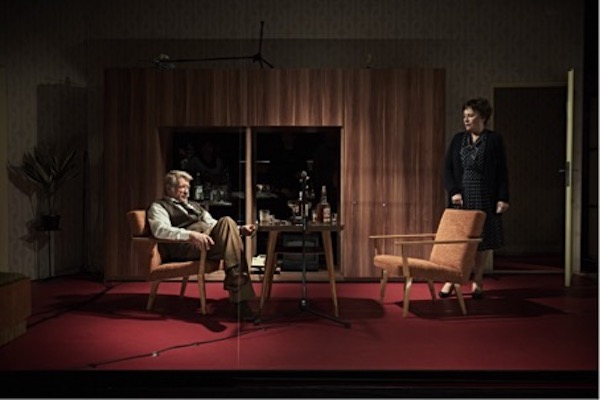
Elites. Photo Credit: Vladamir Kiva Novotny.
The first and most extensive part of the production comprises a series of meetings featuring more or less stereotypical situations involving State Security agents, their collaborators and their victims. However, the initially consistent realistic illusion created by the scenography becomes increasingly disturbed by intertwining scenarios where characters from different scenes appear on stage alongside each other in different situations. E.g. while a well-known actress begs a doctor to arrange an operation for her seriously ill father, two agents are seated next to them, happily watching television. While characters do appear in close proximity on stage, they do not interact as each inhabits “a space of their own.” This highlights the macabre nature of the entire spectacle while also emphasizing the absolute loss of privacy. The fixed scenography, constant lighting, the absence of stage music and a television advertisement sequence broadcast in a continuous loop all highlight the documentary nature of the production and, above all, the uniformity of the times. The perception of people as interchangeable machine components is further emphasized by the fact that the full cast of characters is portrayed by a total of eight actors. Their acting is factual, reminiscent of restrained television realism.
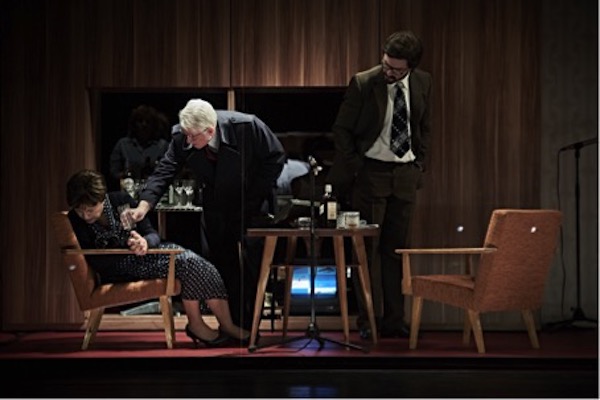
Elites. Photo Credit: Vladamir Kiva Novotny.
To a certain extent, the production has been designed with educated viewers in mind, i.e. spectators are expected to be able to draw comparisons between the on-stage action and their own real-world experience. For example, the future Czech prime minister is portrayed as an overzealous student avidly seeking engagement in state operations in the hope of developing an international career. The character’s behaviour sharply contrasts with the behaviour of the actual person, known to have flooded newspapers with articles about how he repeatedly (and unsuccessfully) appealed to higher and higher courts to have his name stricken from police archives, all the while steadfastly claiming that he had never consciously collaborated with state police. Likewise, the characters of the remaining confidantes seek to actively, and frequently with great fervour, further their own careers. Their diligence and desire for career growth, conditioned by cooperation with communist power, sometimes includes informing on family members and even on their superiors.
In addition to such situations, which constitute the core of the piece, the production also includes several somewhat different scenes, depicting e.g. the case of an actress who withstood repeated State Security recruitment attempts, even after she was blackmailed with her father’s health used as a bargaining chip. Or the story of a pastor who, though he had been imprisoned by the communists in the 1950s, eventually signed a letter of cooperation to save his parish twenty years later. It is almost as if the screenwriters wished to do justice to those who did not succumb to communist pressure, or to those who did so, though not for any kind of personal gain. As a reminder of the drastic deeds carried out by State Security, the production also relates the story of a mother calling in vain for the punishment of border guards who set dogs on her son, caught crossing the border in the hope of emigrating, and then left behind to bleed to death without medical attention. This mention of police crimes seeks to counterbalance statements subsequently made by characters-agents shedding light on their own roles as well as on the role of the secret police, downplaying their engagement to being nothing more than sending in reports on who they met and what they spoke about in capitalist countries, emphasizing that they never, in fact, hurt anyone.

Taña Pauhofová in Elites. Photo Credit: Vladamir Kiva Novotny.
As the play progresses, the overarching illusory realism becomes increasingly disturbed. First, during a dialogue in the kitchen, a stage technician’s tattooed hand reaches out through a ventilator and plucks a siphon bottle from the counter top. Later on, the technician himself appears on stage to remove various props and a full stage crew subsequently dismantles the entire apartment. The end of the ruling regime is nigh. As the technicians demolish walls and remove furniture, and as news of the Velvet Revolution is broadcast on television, the characters seem intent on carrying on as before; hardly noticing anything different, they remain seated around the table, eating sausages. Once the apartment is almost entirely dismantled, chaos breaks out on stage, lights flash unpleasantly and the actors change into their new roles in front of the audience while furiously grabbing sheets of paper raining down from above, apparently as a reminder of the fact that General Lorenc, head of Czechoslovak communist counter-intelligence and one of the main characters of Havelka’s production, had destroyed a trove of materials documenting state security operations, including documents specifying the names of individual informants.
The final, and pivotal, post-revolutionary scene takes place on an empty stage in front of the reflective wall. A young and ambitious reporter has some unpleasant questions for the newly minted elite citizens – the richest Slovak, a Czech politician, a successful writer, a member of the judiciary. Times changed, but they did not. Their career ambitions remained intact, enriched by the benefit of hindsight and a wealth of navigate the chaotic post-revolutionary period, described by one of the characters as “a time when the economy went dark and folks did whatever they pleased.” As the journalist strives to find out how they are all dealing with their conscience, she is horrified to realize that no one feels any guilt. Communist Party membership is downplayed, cooperation with secret police denied. Some even claim to be victims, diverting attention using typical present-day whataboutism or falsely claiming that it was all a symptom of the times and that not everyone can be a hero. At one point, one of the actors delivers a sad message, quoting a sentence by Václav Dvořák, a political prisoner, who said that one of the biggest crimes of Communist contacts obtained during their cooperation with State Security was the devastation of the dignity of life, the wiping out of the boundary between good and evil, the clouding of one’s conscience to the point that it no longer knows when to warn us.
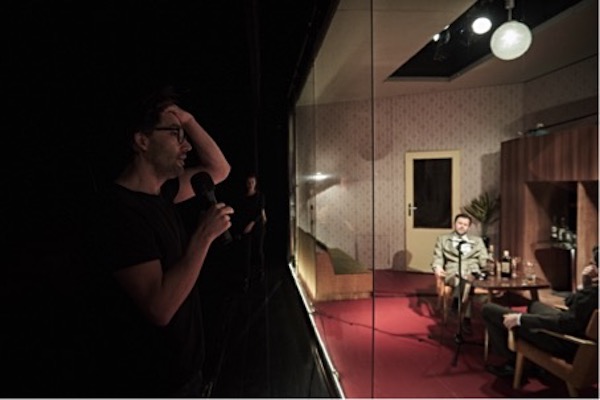
Elites. Photo Credit: Vladamir Kiva Novotny.
As the press interrogation slowly turns into a banquet, complete with champagne, the devastated journalist turns to leave. However, she is unable to locate an exit and remains locked in with the others inside the glass walls, which multiply the reflections of the newly minted social elites like a haunted mirror maze. The journalist frantically runs around the stage in futile attempts to escape the bizarre party while the others mill around with drinks in hand while the interwar country music hit “Long is the Journey to the West” ironically plays in the background.
The theatrical world constructed by Jiří Havelka has always been a conceptual one, and one based on a careful dramaturgical exploration of the subject matter. Along with his long-term interest in the instruments of documentary theatre, these tendencies have in recent years brought him closer to politically engaged theatre. His playfulness and sense of humour alongside the restrained and factually accurate nature of his productions prevent him from producing any kind of straightforward, overblown agitprop pieces.
Jitka Šotkovská is a researcher with the Theatrological Team of the Institute of Czech Literature of the Academy of Sciences of the Czech Republic and a Ph.D. student at the Department of Theatre Studies at the Faculty of Arts of Masaryk University in Brno. Her primary interests include Czech theatre and drama of the twentieth century, amateur theatre and theatre criticism. She has authored a number of studies focusing on modern Czech theatre and published reviews in both Czech and international journals.

European Stages, vol. 13, no. 1 (Spring 2019)
Editorial Board:
Marvin Carlson, Senior Editor, Founder
Krystyna Illakowicz, Co-Editor
Dominika Laster, Co-Editor
Kalina Stefanova, Co-Editor
Editorial Staff:
Joanna Gurin, Managing Editor
Maria Litvan, Assistant Managing Editor
Advisory Board:
Joshua Abrams
Christopher Balme
Maria Delgado
Allen Kuharsky
Bryce Lease
Jennifer Parker-Starbuck
Magda Romańska
Laurence Senelick
Daniele Vianello
Phyllis Zatlin
Table of Contents:
- Introductory Note by Kalina Stefanova.
- “Andrzej Tadeusz Wirth (1927 – 2019) – White on White” by Krystyna Illakowicz.
- Lithuanian Marriage in Warsaw or The Last Production of the Great Eimuntas Nekrošius by Artur Duda.
- “My, Żydzi polscy [We, Polish Jews]”: A Review of Notes from Exile by Dominika Laster.
- A Report on the State of Our Society, According to Jiří Havelk in The Fellowship of Owners at VOSTO5, Prague, and Elites, at the Slovak National Theater, Bratislava by Jitka Šotkovská.
- About Life as Something We Borrow. On the Stages of Pilsen (In the 26 th edition of the International Theatre Festival There) by Kalina Stefanova.
- Redesigning Multiculturalism or Japanese Encounters in Sibiu, Romani, The Scarlet Princess, written and directed by Silviu Purcărete, inspired by Tsuruya Namboku IV’s Sakura Hime Azuma Bunshô by Ion M. Tomuș.
- About Globalization: A “Venice Merchant” on Wall Street, at the Hungarian Theatre of Cluj in Romania by Maria Zărnescu.
- The Patriots, Mary Stuart and Ivanov and the Rise of the Drama Ensemble of the National Theatre in Belgrade by Ksenija Radulović.
- The Unseen Theatre Company or How to See Beyond the Visible: The Shadow of My Soul and the Theatre of Velimir Velev by Gergana Traykova.
- Multilingual Pirandello, Understandable to Everyone: The Mountain Giants at the Croatian National Theatre “Ivan pl. Zajc”, Rijeka by Kim Cuculić.
- The return of the repressed: the ghosts of the past haunt Barcelona’s stages by Maria M. Delgado.
- A poetics of memory on the Madrid stage (2018) by Maria M. Delgado.
- The Danish National Theatre System and the Danish National School of Performing Arts: December in Copenhagen 2018 by Steve Earnest.
- Towards a Theatre of Monodrama in Turkey 1 by Eylem Ejder.
- Where Is Truth? Justiz by Friedrich Dürrenmatt, adapted and directed by Frank Castorf at the Schauspielhaus Zürich by Katrin Hilbe.
- Report from Vienna by Marvin Carlson.
www.EuropeanStages.org
europeanstages@gc.cuny.edu
Martin E. Segal Theatre Center:
Frank Hentschker, Executive Director
Marvin Carlson, Director of Publications
©2019 by Martin E. Segal Theatre Center
The Graduate Center CUNY Graduate Center
365 Fifth Avenue
New York NY 10016
European Stages is a publication of the Martin E. Segal Theatre Center ©2019
Martin E. Segal Theatre Center:
Frank Hentschker, Executive Director
Marvin Carlson, Director of Publications
©2019 by Martin E. Segal Theatre Center
The Graduate Center CUNY Graduate Center
365 Fifth Avenue
New York NY 10016
European Stages is a publication of the Martin E. Segal Theatre Center ©2019



